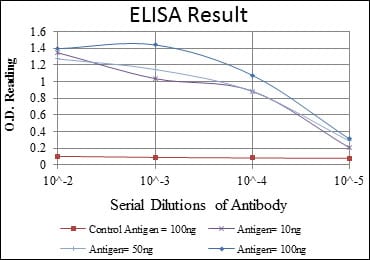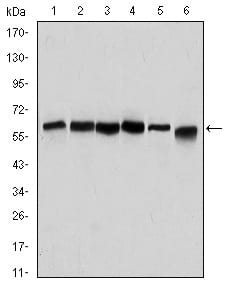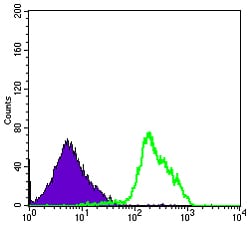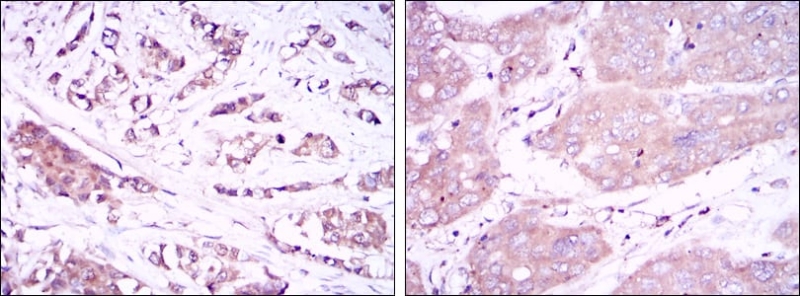



| WB | 1/500 - 1/2000 | Human,Mouse,Rat |
| IF | 咨询技术 | Human,Mouse,Rat |
| IHC | 1/200 - 1/1000 | Human,Mouse,Rat |
| ICC | 技术咨询 | Human,Mouse,Rat |
| FCM | 1/200 - 1/400 | Human,Mouse,Rat |
| Elisa | 1/10000 | Human,Mouse,Rat |
| Aliases | ATG6; VPS30; beclin1; BECN1 |
| Entrez GeneID | 8678 |
| clone | 2A4 |
| WB Predicted band size | 60kDa |
| Host/Isotype | Mouse IgG1 |
| Antibody Type | Primary antibody |
| Storage | Store at 4°C short term. Aliquot and store at -20°C long term. Avoid freeze/thaw cycles. |
| Species Reactivity | Human,Mouse |
| Immunogen | Purified recombinant fragment of human BECN1 expressed in E. Coli. |
| Formulation | Purified antibody in PBS with 0.05% sodium azide. |
+ +
以下是3篇关于BECN1抗体的代表性文献摘要概述:
---
1. **文献名称**: *Regulation of autophagy by cytoplasmic p53*
**作者**: Tasdemir E, et al.
**摘要**: 该研究通过Western blot和免疫沉淀实验,使用BECN1抗体验证了p53蛋白在细胞质中通过与BECN1相互作用抑制自噬的机制,揭示了肿瘤抑制因子p53在自噬调控中的新功能。
---
2. **文献名称**: *HSV-1 ICP34.5 confers neurovirulence by targeting the Beclin 1 autophagy protein*
**作者**: Orvedahl A, et al.
**摘要**: 研究发现单纯疱疹病毒蛋白ICP34.5通过结合BECN1(使用BECN1抗体进行免疫共沉淀验证)干扰自噬体形成,从而逃逸宿主细胞的抗病毒自噬反应,阐明了病毒利用宿主自噬通路促进感染的分子机制。
---
3. **文献名称**: *Autophagy suppresses tumorigenesis through elimination of p62*
**作者**: Mathew R, et al.
**摘要**: 利用BECN1抗体敲除模型,证明BECN1缺失导致自噬缺陷和p62蛋白累积,进而激活氧化应激通路促进肿瘤发生,强调了BECN1在肿瘤抑制中的关键作用。
---
4. **文献名称**: *BECN1 is involved in the initiation of mitophagy*
**作者**: Zhu Y, et al.
**摘要**: 通过免疫荧光和Western blot实验(使用BECN1特异性抗体),研究发现BECN1与PINK1/Parkin通路协同调控线粒体自噬(mitophagy)的启动,为神经退行性疾病治疗提供了新靶点。
---
以上文献均通过BECN1抗体验证了该蛋白在不同生物学过程中的功能,涵盖肿瘤、病毒感染及细胞器质量控制等领域。如需具体期刊和年份可进一步补充。
The BECN1 antibody targets Beclin-1. a 60 kDa protein encoded by the *BECN1* gene, which plays a central role in autophagy regulation. Beclin-1 is a key component of the class III phosphatidylinositol 3-kinase (PI3K-III) complex, essential for autophagosome formation and vesicle trafficking. It interacts with proteins like UVRAG, ATG14L, and BCL-2. balancing autophagy induction and apoptosis. Dysregulation of Beclin-1 is linked to cancer, neurodegenerative disorders (e.g., Alzheimer’s), and infections, as autophagy modulates cellular homeostasis and pathogen clearance. In cancer, reduced Beclin-1 expression correlates with tumor progression, highlighting its tumor-suppressive role.
BECN1 antibodies are widely used in research to study autophagy mechanisms, protein-protein interactions, and disease pathways. Common applications include Western blotting, immunohistochemistry (IHC), and immunofluorescence (IF) to detect Beclin-1 expression levels, localization, or post-translational modifications. Commercial antibodies are often validated for specificity in *BECN1* knockout/knockdown models. Researchers also employ these antibodies to explore therapeutic strategies targeting autophagy, such as cancer treatment or neuroprotection. Variants include monoclonal (e.g., rabbit or mouse origin) and polyclonal antibodies, with selection depending on experimental needs. Proper controls are critical due to potential cross-reactivity with homologous proteins. Overall, BECN1 antibodies are indispensable tools for understanding autophagy-related physiology and pathology.
×